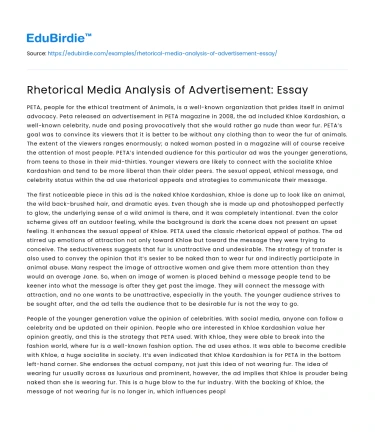PETA, people for the ethical treatment of Animals, is a well-known organization that prides itself in animal advocacy. Peta released an advertisement in PETA magazine in 2008, the ad included Khloe Kardashian, a well-known celebrity, nude and posing provocatively that she would rather go nude than wear fur. PETA’s goal was to convince its viewers that it is better to be without any clothing than to wear the fur of animals. The extent of the viewers ranges enormously; a naked woman posted in a magazine will of course receive the attention of most people. PETA’s intended audience for this particular ad was the younger generations, from teens to those in their mid-thirties. Younger viewers are likely to connect with the socialite Khloe Kardashian and tend to be more liberal than their older peers. The sexual appeal, ethical message, and celebrity status within the ad use rhetorical appeals and strategies to communicate their message.
The first noticeable piece in this ad is the naked Khloe Kardashian, Khloe is done up to look like an animal, the wild back-brushed hair, and dramatic eyes. Even though she is made up and photoshopped perfectly to glow, the underlying sense of a wild animal is there, and it was completely intentional. Even the color scheme gives off an outdoor feeling, while the background is dark the scene does not present an upset feeling. It enhances the sexual appeal of Khloe. PETA used the classic rhetorical appeal of pathos. The ad stirred up emotions of attraction not only toward Khloe but toward the message they were trying to conceive. The seductiveness suggests that fur is unattractive and undesirable. The strategy of transfer is also used to convey the opinion that it’s sexier to be naked than to wear fur and indirectly participate in animal abuse. Many respect the image of attractive women and give them more attention than they would an average Jane. So, when an image of women is placed behind a message people tend to be keener into what the message is after they get past the image. They will connect the message with attraction, and no one wants to be unattractive, especially in the youth. The younger audience strives to be sought after, and the ad tells the audience that to be desirable fur is not the way to go.
Save your time!
We can take care of your essay
- Proper editing and formatting
- Free revision, title page, and bibliography
- Flexible prices and money-back guarantee
People of the younger generation value the opinion of celebrities. With social media, anyone can follow a celebrity and be updated on their opinion. People who are interested in Khloe Kardashian value her opinion greatly, and this is the strategy that PETA used. With Khloe, they were able to break into the fashion world, where fur is a well-known fashion option. The ad uses ethos. It was able to become credible with Khloe, a huge socialite in society. It’s even indicated that Khloe Kardashian is for PETA in the bottom left-hand corner. She endorses the actual company, not just this idea of not wearing fur. The idea of wearing fur usually across as luxurious and prominent, however, the ad implies that Khloe is prouder being naked than she is wearing fur. This is a huge blow to the fur industry. With the backing of Khloe, the message of not wearing fur is no longer in, which influences people to no longer wear or buy fur coats. It moves people in the direction PETA was hoping for.
PETA’s ad isn’t completely superficial though. As said before, PETA is a well know organization, and they did not become popular based on their celebrity endorsements. Since PETA was established over thirty years ago, they have established credibility in the zone of animal advocacy. Once the viewer of the ad can get past the naked Kardashian, they read a statement in the upper corner that states, “Animals killed for fur are electrocuted, drowned, beaten, and often skinned alive.” With this, they introduce the use of logos. It states facts that are shocking t the viewer. An average person would frown upon the torture of animals in order to obtain something as little as a fur coat. Perhaps the information relayed by PETA in the ad is not very known by society. The information from the ad might appeal to the ethics of one and cause them to no longer wear or buy fur. The facts stated also play into pathos. The text is followed by, “Be comfortable in your own skin. Let animals keep theirs.” Together these phrases can a cause feeling, like the picture of a tortured animal. It could give the viewer the sense that the viewer needs to do something about this horrendous act of torturing animals that the ad is speaking of, and what does the ad suggest? The participation of excluding oneself from the purchase of fur items.
The advertisement of PETA does a lot in a rhetorical sense. It attracts viewers by the extreme use of sex appeal. The ad keeps viewers intrigued by pulling at the audience's emotions. It also established social endorsement by using Khloe Kardashian, a woman of high social standing. She is used as an incentive for the message the ad is trying to put across to its audience, which is the production of fur causes animal abuse. If one acts in the buying of fur items they take part in animal cruelty, putting forth the idea of thinking about what you are buying and to stop spending your money and use it for other things rather than fur to help stop the drowning, electrocuting of innocent animals.






 Stuck on your essay?
Stuck on your essay?

